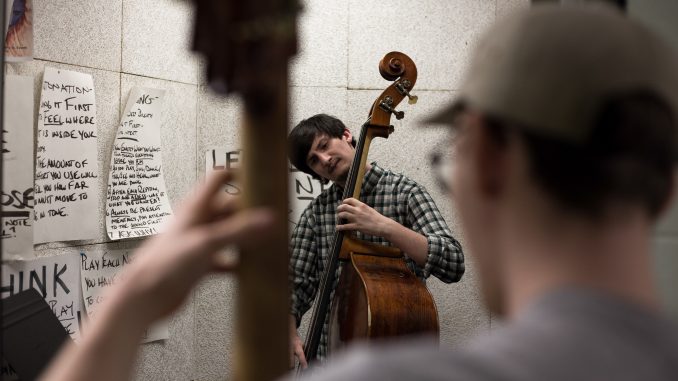
Philadelphia percussionist Jim Hamilton fondly remembers growing up in his father’s dance studio in Kensington, learning about different kinds of musical styles from a young age.
“The concept of things that swing was something I started to understand when I was very young,” he said. “This idea of jazz and its evolution comes from a mixture of cultures … and a big part of jazz’s evolution of course is in the city that we’re living in and where I was born and raised.”
Philadelphia played a large role in the development of jazz music throughout the 20th century. The city’s multi-ethnic population was attracted to the unrestricted, diverse style of music. Producing renowned artists like John Coltrane, Dizzy Gillespie and Charles Mingus, Philadelphia was home to many jazz musicians who helped the progression of the genre in America.
“In a place like New York where there’s every professional jazz musician in the world … and when you’re a student or trying to do something different, it’s not easy to get accepted and play at different places,” said Pete Dennis, a freshman jazz performance major. “But in Philly, it’s a really nice scene where you have the older guys who play with the young guys, and everybody kind of helps each other out and students get really good gigs.”
In 2002, the Smithsonian’s National Museum of American History declared April as Jazz Appreciation Month, or JAM to “herald and celebrate the extraordinary heritage and history of jazz,” according to the museum’s website.
Philadelphia joined the Smithsonian’s mission, putting on dozens of festivals, concerts and events in April focusing on jazz and its importance to the history of the city, including the fifth annual Center City Jazz Festival and the Ars Nova Jazz Series.
Despite the city’s efforts to highlight its vibrant jazz scene, Hamilton and Dennis believe JAM doesn’t truly reflect the entirety of the jazz community, noting that most JAM performances and events focus on the more mainstream, widely accepted examples of jazz rather than exploring different facets of the genre.
Dennis, who started out playing rock and psychedelic music on the electric bass at 13, said the more abstract side of jazz is what first caught his attention as a kid.

“I realized that the link between psychedelic music and jazz was sort of the art aspect,” he said. “And that’s when I got into free jazz or avant-garde jazz … and that’s kind of when it really opened up for me.”
Philadelphia especially served as a creative space for free jazz musicians, with legends like Thelonious Monk and Charles Mingus pioneering the American free jazz movement of the 1950s and ‘60s. Unfortunately, this experimental side of jazz history is not always reflected in popular jazz performances today.
Hamilton added that mainstream jazz has a stiffness to it now which neither belongs nor fits the genre particularly well. He said jazz has been taken from its original bar setting and put into a formal, recital hall setting, which doesn’t reflect the rambunctiousness of the music.
“Jazz has to be looked at in a much broader context, not this narrow, Eurocentric way,” he said. “This whole idea of Black-African classical music and that it belongs in Verizon Hall instead of at a bar or club … jazz was cut off from its environment, and music can’t exist without its environment.”
Jazz started in low-lit bars and loud clubs, Hamilton and Dennis said. And for them, the serious, grandiose attitude that now comes with most mainstream jazz concerts needs to be removed before the city’s jazz community can flourish like it did decades ago.
“I think Philadelphia doesn’t pay enough attention to its legacy of jazz musicians,” Dennis said. “Even today there’s some really incredible jazz musicians.”
“If you’re into jazz, there’s jazz in Philly,” he added. “It’s definitely still there, it’s never going to go away.”
Emily Thomas can be reached at emily.ralsten.thomas@temple.edu.


Be the first to comment